|
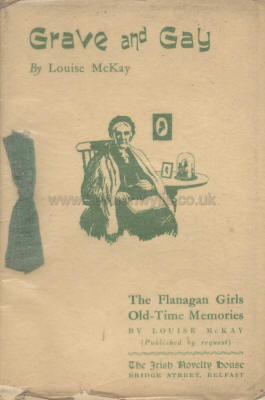 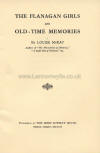  
Grave and Gay by Louise
McKay
The Flanagan Girls Old-Time Memories
The Irish Novelty House, Bridge Street, Belfast
Author of "The Mountains of Mourne" "A Little Bit of Ireland" etc.
Printed by McCaw, Stevenson and Orr, Limited, The Linenhall Works, Belfast
Foreword - I have been asked from time to time to publish Memories of Older
Times - and The Flanagan Girls, a humorous tale of life in the country
to-day. In presenting these varying descriptions of country life of to-day
and yesterday to my readers, I hope that some memory however slight, may be
recalled. - Louise McKay



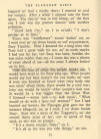


The Flanagan Girls
Many's the one has said to me, "Did
ivir ye come across the Flanagan girls?" but the divil an eye ivir I
clapped on one or other of them till the night of Teggarty's party.
For sure they were well worth havin' a squint at - well worth the five long
Irish miles I traveller over mountain an' bog, jist to have it to say I had
seen the Flanagans. They were twins; an' bad t'ime if I could tell one
from the other. Oul' Biddy Tierney (a neighbour of mine) said to me
time an' again, "Paddy, don't marry till ye see the Flanagan girls."
(Biddy knowed I had a strong notion of marryin'.) So there I was,
sittin' in Teggarty's barn where the dancin' took place, for no other reason
than to see the Flanagan girls. Right enough, there was ivirything
about them to take a man's fancy; so I looked at one an' then at the other.
"Which of them is it to be?" sis I to m'self; "I think I'll try
the wee one; she's a sonsy-lookin' bit of goods." So over I goes, an'
sis I to her (the wee one), "Will ye be my partner, miss?" I meant, of
coorse, my partner at the dance. At that remark, instead of answerin'
me, she an' the other one giggled an' laughed, an' at the same time got up
to their feet, an' I'm blist if they weren't both the same height, an'
whativir way they manoeuvred I couldn't tell which of them I had put the
spake on. "I beg pardon," sis I to the one nearest me, "will ye
dance with me?" "You asked my sister that question jist now," sis she.
She spoke with an English accent, an' she, to my own knowin', reared an'
lived all her day at Skelty's bog. "Troth maybe I did," sis I.
Not to be outdone I attacked the other one with the same question.
"Oh, certainly," sis she; an' while I looked roun' for a seat for her
they had changed places again, an' the divil a bit of me knowed which was
which. Howanivir, after they had confabbed together for a while, one
of them came forward an' offered to give me the first dance; I could
see they wanted to have a shine out of me. No doubt they thought me an
ignorant chap that couldn't dance, but I could tell tham I was two winters
at Phil McGladdery's dancin' class; I wasn't such a clown as they took
me for, so I put on my best manners: "Allow me, miss," sis I, as
I offered her my arm. There was a polka goin' on at the time, an' that
was the one dance I was a master-hand at; so as we futed it roun' an' roun'
she drawled out, "I'm not used to dancin' polkas; they're quite
out-of-date," an' added, "I wish they'd give us a fox-trot."
Now I nivir heard word of that trot; maybe she did at Skelty's bog.
Folk said there was fairies at Skelty's bog - maybe they learned her. Her
nixt remark was, "I wonder could I have an ice?" Well she knew that ye
might as well look for a needle in a hay-stack as ask for ices at Teggarty's.
By this time we were seated, an' I could see her sister an' herself
exchangin' looks an' laughin' for all they were worth. There was
others in the plot as well; it was easy seein' I was the clown of the evenin',
but I took my time; I wasn't as green as I looked. "Have a cigarette,"
sis she, as she took a case out of a bag business she had tied to her waist.
"Have a cig," she repeated in a drawly kin' of voice that she nivir learned
at the bog side; "they're a good brand." Her nixt move was to strike a
match on the heel of her shoe an' light the same cigarette with an air of
freedom as is she was London born. Iviry eye was on us. "There
goes the Blue Danube," sis she; let's have a waltz." I noticed her
sister got up to dance jist then with what seemed to me to be a polisman all
dressed up. They kept noddin' an' winkin' at my partner. Sis I
to m'self, "I've had enough of this; they'll be makin' a ballad on me if I
stay here any longer. The Flanagan girls may go to blazes for all I
care." So when she asked me to waltz, I jist said, "Excuse me,
miss," an' I walked straight out. As I said, I walked out, an' went
into Teggarty's haggard an' had a smoke there; I wanted to cool my temper.
After a while I slipped into the barn again. The dancin' was in full
swing, an' the first one I saw was my partner dancin' with another polisman.
"Good luck t'ye," sis I to m'self; "I don't grudge ye to him."
There was "wallflowers" aroun' lookin' on, so I went over an' sat down
beside an oul' acquaintance, Susy Trimble. Now I knowed for a long
time that Susy had a great wish for me, an' in troth maybe I had one for
her, but Susy was lame, besides she was miles oulder than me - I mean she
was a wheen of years ahead of me - all the same I always looked up to her.
Only for fear of what the people would say, I would have went in for Susy
long ago. What people would say has kept many's the one back; an' sure
if iviry one knowed or heard what iviry body else was sayin' about them,
there would be a civil war; iviry one would be tearin' other people's hair
out. It would be a war bigger than the Great War. I listened -
worse luck - to folk sayin', "What would ye do with a lame oul' woman?"
but I had learned my lesson; the Flanagan girls gave me the scunner
(disgust); so, as I said, I sat down beside Susy. Susy was a niece of
the Teggarty's, an' she owned thirty acres of lan', not to speak of bog
land, so she was no pauper. "It's a warm evenin', Susy," sis I.
"It's all in the way you take things," sis she. "What d'ye mane?"
sis I. Her nixt question took me unawares. "What forder
(progress) did ye make with the Flanagan girls?" "The Flanagan girls,"
sis I; "sure they're only 'bletherskites'; they ought to go from home
to some place where nobody knows them, to show off." "All the same,"
sis she, "you were took on with them." "Oh, for that matter,"
sis I, "a body has to pass himself; they're good sport - London
born ye know." Susy laughed. Jist then the Teggarty's called out
that the tay was ready. I wanted no tay; so whilst the others was
movin' into Teggarty's parlour I stole out by m'self. The moon was in
the full, an' the stars was shinin' in the heavens. I'm no scholar,
but I learn a lot from nature: when I'm all "me lone" I can sense things as
I look up at God's great firmament. At these times there comes a peace
to my heart and noble resolves. As I stood there I thought of Susy.
Susy, like m'self, was fond of nature; she was always cheery an'
bright, no put on - jist natural, an' I always knowed she had it in her to
make a man happy. But what the people would say kept me back all these
years, an' there the thing lay. The Flanagans turned the scale for me;
I seen things as nivir before, an' so under God's beautiful sky I made the
resolve that I would marry Susy. When the party broke up I helped Susy
on with her jacket, an' saw her safely home. As we went along I says
to her, "How is the crops lookin', Susy?" "Not so bad,"
sis she, "considerin'." "Considerin' what?" sis I. "Och
well, ye know, Paddy, I have no man to look after the workers." "How
would ye like me to do that, Susy?" Now I needn't set down any more,
other than to say that I got the job. I nivir rued it - no, nivir.
Sometimes when I'm a bit crusty with Susy (an' min' ye I have no reason to
be so), she looks over her spectacles at me an' says, "Paddy, ye
should have married one of the Flanagan girls." Then I jist turn away
to hide a smile.
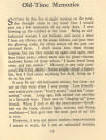







Old-Time Memories
Sitting by the fire
to-night musing on the past, the thought came to my mind that I would pass
on a few memories of my early days. I was blowing up the embers at the
time. Being an old-fashioned woman I use bellows, and many a time I
lean my elbows on the same bellows and gaze into the glowing coals, for
often scenes of the past are pictured there. I don't know how these
things happen, but one face comes up again and again, and then fades away;
others anon take its place - forms, shadowy forms of those whom "I
have loved long since and lost awhile." Memory is my only company, for
I live alone. Some people dread a lonely life, but I find mine
anything but dull, living as I do in the past. It may be my
old-fashioned notion, but times are not as they were when I was young.
Less friendliness exists now, more "hurry-scurry" and this
"time-saving" craze. Long ago, folk visited one another in a
leisurely way. There was no "ringing-up" your friend.
when I look at all the innovations - breakfast on the train, electric light,
motors, and flying machines - I feel glad that the most part of my life is
over. However, it was not about modern improvements I meant to write,
for I am an unlearned woman, old and full of years, but merely to set forth
some memories of "days that are gone." I am the only one left of the
generation I write about, and I feel I am treading on sacred ground.
Someone has written, "To-day is commonplace, yesterday is glorified by
memory."
Memory beings me back to the little village of Purdysburn, within three
miles of Belfast, in which was my home. I think I can see that old
homestead as it was in those far-off days - a dear, roomy house with lofty
windows, over which hung festoons of roses, rambler roses, which drooped
down to caress the honeysuckle that clambered up over the spacious porch.
But it is the memory of the garden that holds for me the greatest charm.
I wish I could describe it as it was in the days of my youth, with its dear
old-fashioned flowers. Flowers of to-day may excel them in variety of
blooms, but old-time flowers are to me like old friends, old songs - because
they abide with us for ever. In memory's garden I see the tall
foxgloves, the stately bluebell, the ever-charming hollyhocks that grew
around the old sun-dial, the neat boxwood border that enclosed the lilies,
sweet-Jane, winter cherries, and other old-time flowers. Again I fancy
I can see the syringa arbour where, as children, we played and dreamy dreams
in the long summer days. As the years passed on we had other "ploys"
there - family conclaves, courtships, merry-makings. As I think of it
all I wipe away a tear, for, alack-a-day! all my early friends who
figured there are now lying in the valley, asleep, and the summer-house is
no more. The recollection of it all lingers with me still, like the
last rays of the setting sun which glorifies all around - the memory of that
home garden fills my heart, One corner was reserved for the bees that
from
Old-fashioned flowers their honey did make
In the old-fashioned way, in their houses of straw,
Contented and happy, for fashion's no law
To the bee.
Honey was more used then
than at present (strange). Mother had a custom of telling the bees all
her troubles. Once she neglected doing so, and they left and never
returned. Some of our neighbours who kept hives had a similar
experience. It was a popular belief then, and I have since heard of
English beekeepers who were most particular about telling the bees of the
death or other trouble in their family. We had a great collection of
herbs in our garden that "cured every ill." Doctors nowadays
smile at the name of these simple remedies, because they are considered
"out-of-date." Yet I believe with these same herbs mother cured more
people than the doctor. There was simplicity of living in those days.
Newspapers were scarce. Our paper was passed round to half a dozen
people. Very often the neighbours gathered round our hearth in the
evenings to hear the News-Letter and Commercial Chronicle read, and to talk
over the politics of that time. Those were the days of Palmerston and
Peel. Nor has we many magazines: The Dublin Penny Journal was widely
read, Reynolds' Miscellany and The Spectator were very popular. One
other Belfast magazine called the Quizzing Glass was greatly sought after,
for in it were reflected the doings and undoings of Society. Certainly
things moved more slowly. I recollect, when a child of seven, going
with my father to see some relations off to America. I was dressed in
a little nankeen spencer, white sun-bonnet cased with flax, and a white
dimity dress. The quays at that time were well up into High Street.
The vessel that our friends sailed in was very different from those of
to-day. I remember quite well seeing the bunks, which looked to my
youthful eyes very dark and uncomfortable. The voyage to New York
occupied sixteen weeks - that was eighty years ago. (1858)
Father predicted then that there would come a time when the journey would be
accomplished in sixteen days, little dreaming that I should live to see it
done in six days, or even less than six.
My father was
"everybody's body"; by that saying I mean he was a public man.
He held a government situation, and acted as tutor to gentlemen's sons in
the neighbourhood. He was a surveyor of land as well. In those
days few of the peasant class could write, and often of an evening father
was called upon by someone who wanted him to act as scribe. I remember
hearing one address him after this fashion: "Mr. Grey, I want ye to
write to our Tammy in Ameriky an' say to him we hope he's well, an' that we
are all well, an' that we hope he's gettin' on well." Often father
would lay down his quill, unable to proceed, it being so laughable,
Then the visitor proceeded: "An' Mr. Grey, tell Tammy that tho' we're
poorer than iver, if he doesn't like over beyont, tell him to come home to
his mother an' me, an' we'll share our last pratie with him, we will, God
bless him!" It wasn't every day the working class could afford to send
letters to America, as the postage of a letter to New York at that time cost
one shilling. Labourers' wages were 6s. per week, and out of that sum
1s. went for rent. I have known large families reared on 5s. per week.
Certainly, they grew their own potatoes, which with milk formed their
principal article of diet. Tea was 5s. per pound: that beverage only
appeared on their tables on Sundays. Sugar was one shilling per pound,
butcher's meat four-pence per pound, and eggs fourpence per dozen.
White bread, as baker's loaf was then called, was considered a luxury, and
was bought on great occasions only, such as weddings and christenings.
I remember in my early days going to Ogden's in High Street for pastry of a
kind that's not to be had nowadays, and to Linden's, Corn Market, for wine
biscuits and spice cakes. It would be difficult for the present
generation to imagine what Belfast was like eighty years ago. Few of
the young folk now could say where Montgomery's Market (now Castle Market)
is situated, yet I remember farmers selling their produce there. Those
were the days of the stage coaches. It seems to me but yesterday that
the mail coach with its four fine horses started from the "Donegall Arms" in
Castle Place for Dublin. Crowds would assemble when the coaches were
expected back, to hear the latest news from the metropolis. The
coaches now belong to the past, and with them has gone the kindly sentiment
of that time. Gone likewise are the old familiar faces, and strangers
and stranger ways now occupy the public arena.
One eventful day stands
out clearly through the mist of the years - the day that saw the first train
leave Belfast on its way to Lisburn. The excitement that event caused
is past the telling. Farm hands left their work in the fields, women
threw aside their spinning-wheels, and all made for the nearest point of
vantage. My mother and I viewed it from Pow's Hill. As a matter
of fact we saw only the funnel and the smoke; all the same, that was a
red-letter day. I can well remember the thrill of wonderment that
possessed me as I looked after "the iron horse," as the engine was
called. Some said it was uncanny, others that the devil had something
to do with the wonderful monster. Certainly the noise the engine made
and the clitter-clatter of the metals were to our ears very frightsome.
How many are living now, I wonder, who saw that train! Some time
afterwards we went for a jaunt to Lisburn in it. It was a rainy day,
and as there was no covering overhead we had to keep our umbrellas up; in
fact, the carriages were made somewhat after the pattern of the cattle
waggons of to-day. I remember being greatly amused watching the drips
off a lady's umbrella trickle down a man's back - inside his collar - and
the man in question took it so patiently, I verily believe he thought this
infliction part of the train arrangement. I also remember hearing my
father say that when the gentry travelled to Dublin in the early part of the
last century they always made their wills before starting. They drove
to the metropolis in their own carriages drawn by four horses with
postillions. Most old people like to think back to their childhood's
days - to the days of "make-believe." I often say that the children of
this generation have more advantages than we had. Our toys were few;
certainly we had dolls, but of a kind that would be thought ugly now - stick
dolls with terrible faces. Nor had we many juvenile books. The
Children of the Abbey was widely read; and later, Carleton, Lever, and Miss
Porter's works. Youngsters nowadays are satiated with literature and
throw away what we would have prized and treasured. Making samplers
occupied our spare time - every girl made a sampler in cross-stitch, which
contained the alphabet, usually with a verse underneath and the worker's
name. They were very frequently framed - I believe, indeed, our
parlour boasted of four such samplers. Quite lately, I came across the
remains of one I made when I was ten years of age; it is old now and faded -
only the name is legible: "Jane Grey. Anno Domini, 1835."
Children then were taught to know the value of time, and to have a time for
everything. Sewing, knitting, and spinning were our chief
accomplishments - sewing machine were unknown. In after years, Sandy
Robinson, the tailor, bought one, and the people far and near flocked to see
it, and so surprised were they to see how quickly the wonderful machine
could sew that Sandy was called "the steam tailor" ever after.
The spinning-wheel, now finds a place in lofts and storerooms, and reels are
hung up in solitary state on kitchen walls. One hears no more the
pleasant "birr" of the dear old wheel, nor the click-click of the faithful
winder. Looking through old-time papers lately, I came across the
following lines:-
------ continued below

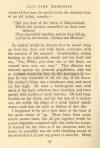






The Auld Wife's Farewell to Her Spinning-Wheel.
"Now fare ye well my canty old wheel,
In age and youth my staff and my stay,
How gladly at gloamin' my kind auld chile,
Has watched thee busy and birrin' away.
And though we never had muckle o' gear,
And though we never were blest wi' a bairn,
For cauld and hunger we hadna' to fear
As I sung my song and I spun my yarn.
And now my poke and my staff I maun take
And wander away, an amous, to beg,
For a plack in the day is the most I can make
Though I work at my wheel till I'm blind as a cleg,
An' work till the witchin' hours of the night -
A time rather late for a thing like me.
But the gude auld days are gone out o' sight,
An' it makes the salt tear often fall from my een,
For the lords o' the mill and machine hae decreed
That buddies like me maun beg their breid."
From a very early date I
was on the habit of going twice yearly to my grandfather's house in the
Ards. My grandmother taught me to spin when I was nine years of age.
I fancy I can see her yet in her large mutch and white kerchief folded
across her breast, showing me how to handle the distaff and putting my tiny
fingers over the yarn. She was seventy years of age at that time, and
was born in 1766. Very often the late Lord Dufferin, then a youth,
when out shooting, would call on his way home to see grandmother; she always
handed him her snuff-box on these occasions, and he, laughingly, would tap
the lid and take a pinch. They then would crack jokes together.
He was very chatty - many an hour he spent in that old farm-house.
Nothing pleased my childish imagination better than to hear my grandfather
on a winter's night, when we would all be seated around the peat fire,
relate how at the time of the rising in '98 he fought at the battle of
Ballynahinch. After relating the blood-curdling events of the time, he
would recite the opening verse of an old ballad, namely :-
"Did you hear of the battle of Ballynahinch,
Where the country assembled on their own defince?
They assembled together, and on they did go,
Led on by two heroes - Clokey and Munroe."
So excited would he become that he would jump up from his chair and walk
about, overcome with the emotion of the moment. Grandmother, sitting
knitting in the inglenook, would nod her head and say, "Yes, Willie,
you were aye to the front; no coward were you, my man." This allusion
was directed against my paternal grandfather, who hid in a straw stack for
fear of the red-coats - a fact that he was reminded of till the day of his
death. My mother's father was a handsome man, and stood six feet high.
He wore a bottle-green coat with skirts at the back, velveteen knee
breeches, and fawn gaiters with moth-o'-pearl buttons. He had large
buckles on his shoes, and his hat was of a curious cut, not unlike the shape
of a crock turned upside down; such was the style or fashion of that day.
I happened to be on a visit there at the time of the great storm of '39.
There have been many severe storms since, but all put together would be a
mere bagatelle compared with that awful hurricane. It seemed for the
time as if the elements were let loose; so unearthly was the wild shrieking
sound of the wind that it is past my power to describe. Many thought
the last day had come. Windows were blown in, doors taken off their
hinges and carried, or should I say hurled, away for miles. I remember
all in the house stood with their backs to the door as a precaution to
prevent it from being blown in. During a lull in the gale my uncle
ventured out to see to the cattle. Looking through a window by the
light of the moon, I saw him carried right off his feet and dashed against a
stone wall about twenty yards away. A stack of corn just then was
carried away clean off the stone pillars and deposited intact at the extreme
end of the haggard, as if it had been built there. This was considered
a most wonderful phenomenon. The thatch was blown off hundreds of
houses, and very frequently the walls fell in. Animals without number
were lost in the merciless fury. To add to the weirdness of it all,
the two house dogs kept howling most dismally. I pray God such a storm
may never visit our shores again. Later, on returning home, I found
that nearly all the giant trees, centuries old, had been uprooted and had
turned somersault; in fact, with their branches resting on the ground and
their immense roots in mid-air. It was such a wonderful sight that the
Squire would not allow them to be removed for a long time.
Amongst my cogitations I
often think if the people I used to know, who are dead and gone, could come
to life again, and see the electric light switched on, alack-a-day, I verily
believe they would want back to their rest again. What a change from
the days of the tallow candle! The candle was the only artificial
light to be had in country places at that time. They were placed in
large candlesticks which stood on the floor and could be adjusted to any
height by pressing a spring. I remember my little brothers used to
amuse themselves shooting the candle up to the ceiling, which was rather a
dangerous practice. Somehow, to my mind, candles showed a better light
then than they do now. Composites were used on Sundays only and when
we had company; then the great brass candlesticks were brought out as well
as the silver snuffers. I remember hearing at the time of the American
War between the Northern and Southern States of a woman who went to buy
candles. The shopkeeper remarked that candles were dearer now as
tallow was up in price owing to the American War. "The Ameriky War,"
she replied; "bad luck to them, and do they fight with candle light?"
Writing of candles beings up an incident to my mind. Dr. Hunter and my
father were in the habit of having a game of cards occasionally at our home.
On one particular night - it was the small hours of the morning in fact, and
all the household had long since retired to rest - they were playing an
interesting game, when suddenly the candle burnt out. The fire had
burnt out too, and matches then were unknown. In the search for
candles, both played blind man's buff, and, in trying to make as little
noise as possible, made all the more - plates rattled off the dresser, but
still the search went on. There were high stakes on the game, and
light must be procured at any price. At length my father stumbled on a
heather broom, which was promptly tied to the candlestick, and with the aid
of the tinder box, which every man in those days carried in his pocket, the
besom was set alight, and while it burned my father won the game.
"Burning the besom" became a proverb in our house ever after.
I wonder if any of the
present generation have ever been to a "quilting"? In the time of full
moon there would usually be quilting parties all over the country. I
remember, when a girl of fifteen, going in charge of our servant, Patience
Lalor, to a "quilting" at a farm-house convenient to Shaw's Bridge. At
these functions the girls would assemble early in the afternoon and commence
sewing on quilts, which was called "quilting." These quilts would be
spread out on trestles or frames - I have seen as many as six young women
sit sewing around one of these frames. After the quilting process was
over, and the frames cleared away, tea would be served. Then "the
boys" dropped in at "day-li'-gone" and a fiddler would strike up a stirring
tune - the girls retiring to one end of the barn and the boys to the other.
Then came the choosing of partners: two chairs were placed in the centre of
the floor, and to one of these seats a "gallant" would bring the girl he
liked best. A song was then sung which was called the "Marrying Song,"
and when all the lads and lasses got "married" after this fashion, the fun
began. That was a memorable night for Patience Lalor. Poor
Patience! I see her in fancy yet dancing a jig with her sweetheart,
Bob Gillespie. Bob was a ploughman; all the same he was a very nimble
dancer. To my mind there is nothing half so uplifting as an Irish jig
or reel, and only an Irishman can put the "go" or "dash" into it.
Patience was in high glee that evening. She was a bonnie lass, with
cheeks like roses and flashing eyes; very witty was she, and had her answer
ready for all comers. As I have already said, she was our
maid-of-all-work. She came to live with us when she was twelve years
of age, and stayed until she got married twenty years later. Servants
in those days did not change their situations as now; your servant was your
friend then. That, indeed, was a memorable quilting night for
Patience, for Bob popped the question, and a few weeks later the marriage
took place. It seems like yesterday that I saw Patience on her wedding
morn attired in a slate-coloured bombazine dress set off with pink ribbons,
her hair done up in curls that clustered over her ears, and finished off at
the back by a high comb. Weddings in those days were very different
from what one is accustomed to see now. Marriage presents were unheard
of; now, present-giving is the rage; it has become a "fever" in
fact, and I like it not.
The year following the
exit of Patience from our home (1848) saw a great shadow fall over our land.
It was called the year of the "blight"; that is, total failure of the
potato crop. The blight extended well through the year '49.
Those were dark days for Ireland; the suffering caused by want, then, has
never been told, for there were many who hid their extreme poverty and so
died of slow starvation. As I have previously stated, the peasant
class dieted mostly on potatoes; in other words, potatoes were the only
article of food obtainable for breakfast, dinner, and tea. The best
potatoes in my young days were called black seedlings, and sold at 1s. 6d.
per cwt. Indian meal was introduced into the country then; somehow the
peasantry disliked it so much that they nicknamed if "sawdust."
Alack-a-day! the misery of that time is untellable. One incident comes
to my mind as I write. Jimmy Duff, the village shoemaker, together
with his apprentices, dug over half an acre of ground one day in order to
obtain a meal of potatoes. They succeeded in getting a small
basketful. Just at that moment the hounds and red-coats bounded over a
hedge close by; each digger threw down his spade, and made off after the
chase. My sister, who happened to be on a neighbouring hill watching
the sport, seized her opportunity and ran off to the potato field, and
carried away the basket of "spuds." No one knew of their destination
save the Widow Maguire, to whom my sister gave them, nor could anyone
imagine the chagrin of the diggers when they returned from the hunt to find
their booty gone - the outcome of a day's labour. There are few living
now who remember those terrible years.
These old-time memories are ever with me; the quiet and east-going pace
lived by us all in
those far-off years is in strange contrast with the bustle of to-day, and
the recollection
of it all brings peace to my heart. So as I sit by my hearth to-night,
I poke up the
embers and see all these scenes reflected there, till they disappear. as I
shall
soon, when the day is over.
Louise McKay
+ + + + + + + + + +
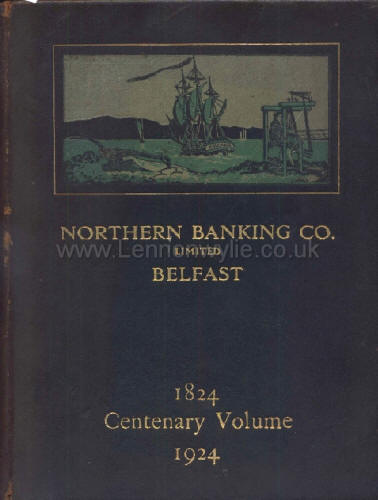
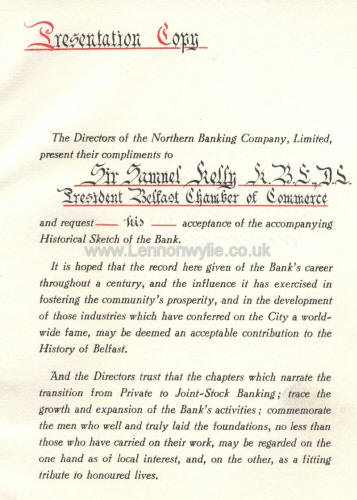
Click here for a more complete account
of this volume and the lists of soldiers and memorials
Northern Banking Co. Limited, Belfast
1824 Centenary Volume 1924
Presentation Copy
The Directors of the Northern Banking Company, Limited, present their
compliments to
Sir Samuel Kelly, K.B.E., D.S.
President Belfast Chamber of Commerce
and request his acceptance of the accompanying Historical Sketch of the
Book.
It is hoped that the record here given of the Bank's career throughout a
century, and the influence it has exercised in fostering the community's
prosperity, and in the development of those industries which have conferred
on the City a world-wide fame, may be deemed an acceptable contribution to
the History of Belfast.
And the Directors trust that the chapters which narrate the transition from
Private to Joint-Stock Banking; trace the growth and expansion of the Bank's
activities; commemorate the men who well and truly laid the foundations, no
less than those who have carried on their work, may be regarded on the one
hand as of local interest, and, on the other, as a fitting tribute to
honoured lives.
+ + + + + + + + + +
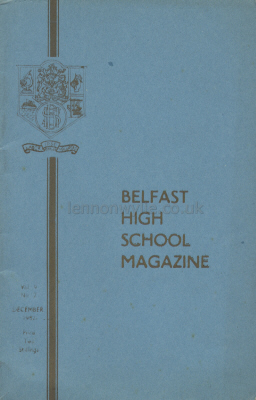
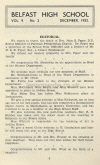





Belfast High School Magazine
December 1952 Vol. 9 No. 2
Editorial: We regret to report the death of
Rev. John S. Pyper, D.D., Senior Minister of Portrush Presbyterian Church.
Dr. Pyper was a Governor of the School from 1929-1947 and a brother of Mr.
H. S. R. Pyper, B.A., a former Headmaster. We extend our deepest sympathy to
Mrs. Pyper and the family. We congratulate Mr. Abernethy on his
appointment as Head of the Science Department. We welcome must (most)
cordially our new members of Staff. Mr. Rowland-Jones is Head of the Music
Department in succession to Mr. Orton. Mr. Ferris has added to the strength
of our Science Department. Miss McConnell, Miss Smyth and Miss Shearer have
been appointed to posts in Ardilea House. Miss Helen Rea has taken Miss
Robinson's place at Jordanstown. We giver a very special welcome to Miss
Kirkwood, not so long ago one of our own pupils, who has now completed a
distinguished degree course in Mathematics at Queen's University, and has
returned to us as a member of the High School Staff. We also welcome two new
part-time teachers - Rev. R. H. Kimber has taken over the major share of the
teaching of Scripture to our Senior forms. Miss Whitsitt is responsible for
the teaching of Art in Ardilea House. We give a warm Ulster welcome to
M. Gauduchon and hope he will enjoy this year at the High School.
Congratulations to Mr. and Mrs. Heaney on the occasi0on of their marriage.
They have our very best wishes for their future happiness. Congratulations
to Mr. and Mrs. Wood on the birth of a daughter. We send congratulations to
Mr. and Mrs. J. Craig on the birth of a son. Mrs. Craig is a Vice-President
of the Old Girls' Association and a former Head of the Mathematics
Department. Congratulations to Miss Loughrin on her marriage to Mr. John A.
Phillips. We send them our very best wishes. We congratulate Miss E. G.
Henderson, N.F.F., on being awarded her L.G.S.M., A.T.C.L., A.L.C.M. and
L.A.M. (with Gold Medal). many many more
names mentioned throughout this magazine CLICK on images to enlarge.
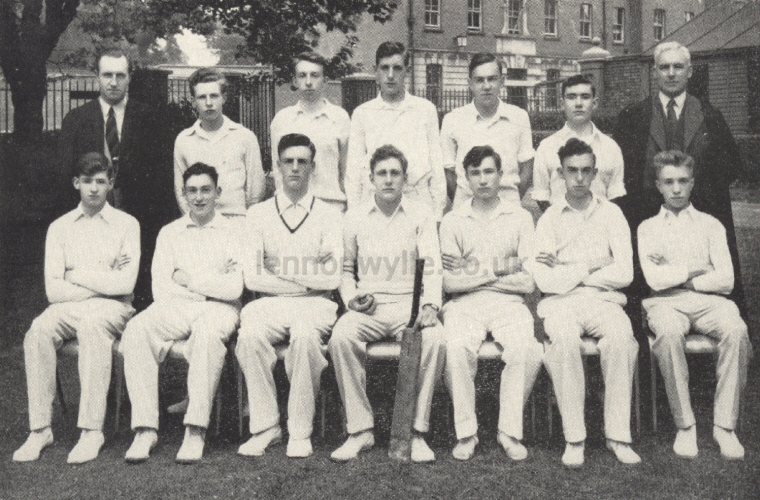
Cricket 1st XI 1952








CLICK IMAGES TO ENLARGE








CLICK IMAGES TO ENLARGE
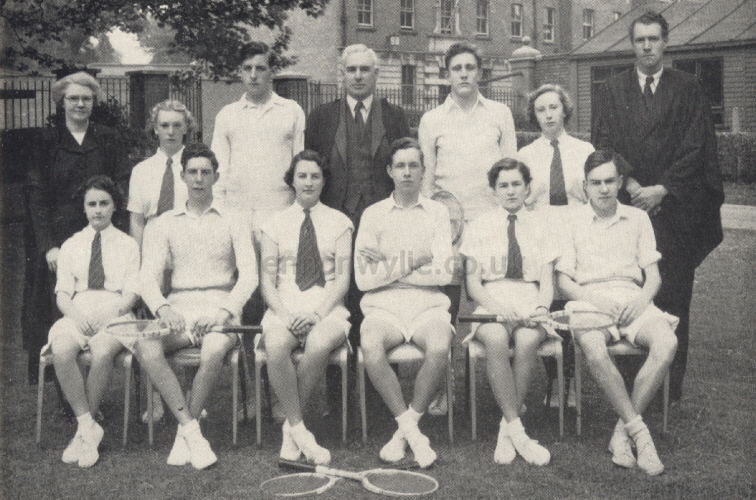
Tennis 1952



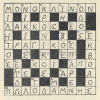
Crossword Answers
+ + + + + + + + + +

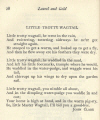







Laurel and Gold Anthology,
John R. Crossland - John E. Donaghey, Coolnafranky House, Cookstown
Little Trotty Wagtail: Little trotty wagtail, he went in the rain,
and twittering, tottering sideways he ne'er got straight again. He stooped
to get a worm, and looked up to get a fly, and then he flew away ere his
feathers they were dry. Little trotty wagtail, he waddled in the
mud, And left his little footmarks, trample where he would, he waddled in
the water-pudge, and waggle went his tail; and chirrupt up his wings to dry
upon the garden rail. Little trotty wagtail, you nimble all
about, and in the dimpling water-pudge you waddle in and out; your home is
high at hand, and in the warm pig-sty, so, little Master Wagtail, I'll bid
you a good-bye. John Clare
The Owl: When cats run home and light is come, and dew is cold upon
the ground, and the far-off stream is dumb, and the whirring sail goes
round, and the whirring sail goes round, alone and warming his five wits,
the white owl in the belfry sits. When merry milkmaids click the
latch, and rarely smells the new mown hay, and the cock hath sung beneath
the thatch, Twice or thrice his roundelay, twice or thrice his roundelay,
alone and warming his five wits, the white owl in the belfry sits. Alfred
Lord Tennyson
The White Sea-Gull: The white seagull, the wild seagull! a joyful
bird is he, as he lies like a cradled thing at rest, in the arms of a sunny
sea! the little waves wash to and fro, and the white gull lies asleep; as
the fisher's boat, with breeze and tide, goes merrily over the deep, the
ship, with her fair sails set, goes by, and her people stand no more.
How the seagull sits on the rocking waves, as still as an anchored boat, the
sea id fresh, and the sea is fair, and the sky calm overhead; and the
seagull lies on the deep, deep sea, like a king in his royal bed! Mary
Howitt
click images to read more


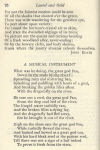













 
The Touch of the Master's Hand
+ + + + + + + + + +
+ + + + + + + + + +
+ + + + + + + + + +
+ + + + + + + + + +
+ + + + + + + + + +
|



















































































